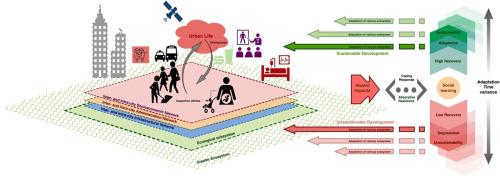复原力与可持续性:人为社会-生态-技术系统对外部灾害适应的刺激-恢复-适应模型
IF 10.9
1区 环境科学与生态学
Q1 ENGINEERING, ENVIRONMENTAL
引用次数: 0
摘要
为了应对不断升级的不确定性和威胁全球人类栖息地的风险,本研究强调了弹性和可持续城市发展的迫切必要性。目前的复原力框架主要侧重于城市快照的灾前评估,缺乏概念整合,未能描述动态。这种差距,再加上跨学科概念上的模糊性,加剧了“指标疲劳”,阻碍了基于证据的政策制定。我们提出并强调了人类社会-生态-技术(ASET)系统在自适应性质和功能与服务之间的区别方面的基本差异。然后,我们引入并发展了刺激-恢复-适应模型,旨在协调概念,并用经验证据系统地捕捉不同情景下的城市动态。以服务为基础的指数可有效衡量和强化城市韧性能力,从而促进模型的实际实施。这种方法促进了弹性研究和政策制定,解决了弹性和可持续性研究中的理论和实践挑战。本文章由计算机程序翻译,如有差异,请以英文原文为准。

Resilience and sustainability: The Stimulus-Recovery-Adaptation Model for adaptation of Anthropogenic Social-Ecological-Technological Systems to external disasters
In response to escalating uncertainties and risks threatening global human habitats, this study emphasizes the critical necessity for resilient and sustainable urban development. Current resilience frameworks, which mainly focus on pre-disaster assessment of city snapshots, lack conceptual integration and fail to depict the dynamics. This gap, compounded by interdisciplinary conceptual ambiguities, fuels "indicator fatigue," obstructing evidence-based policymaking. We propose and highlight the foundational differences of Anthropogenic Social-Ecological-Technological (ASET) systems regarding their self-adaptive nature and the distinctions between functions and services. We then introduce and develop the Stimulus-Recovery-Adaptation model, aiming to harmonize concepts and systematically capture urban dynamics under different scenarios with empirical evidence. The service-based index was forwarded to effectively gauge and fortify urban resilience capacities, thereby facilitating the practical implementation of the model. This approach advances the resilience scholarship and policy formulation, addressing both theoretical and practical challenges in resilience and sustainability research.
求助全文
通过发布文献求助,成功后即可免费获取论文全文。
去求助
来源期刊

Resources Conservation and Recycling
环境科学-工程:环境
CiteScore
22.90
自引率
6.10%
发文量
625
审稿时长
23 days
期刊介绍:
The journal Resources, Conservation & Recycling welcomes contributions from research, which consider sustainable management and conservation of resources. The journal prioritizes understanding the transformation processes crucial for transitioning toward more sustainable production and consumption systems. It highlights technological, economic, institutional, and policy aspects related to specific resource management practices such as conservation, recycling, and resource substitution, as well as broader strategies like improving resource productivity and restructuring production and consumption patterns.
Contributions may address regional, national, or international scales and can range from individual resources or technologies to entire sectors or systems. Authors are encouraged to explore scientific and methodological issues alongside practical, environmental, and economic implications. However, manuscripts focusing solely on laboratory experiments without discussing their broader implications will not be considered for publication in the journal.
 求助内容:
求助内容: 应助结果提醒方式:
应助结果提醒方式:


